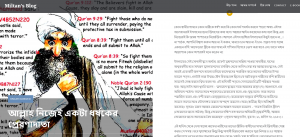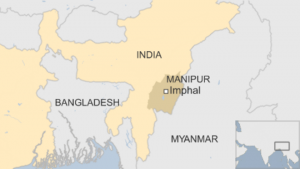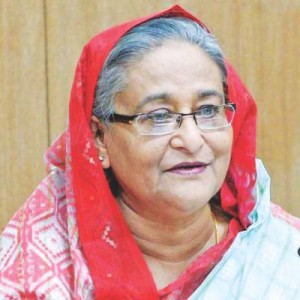Minorities in Bangladesh: A matter of survival
At least 100 Hindu were killed and 31 were disappeared in 2017 as a result of communal attack in Bangladesh; according to a report of BJHM (Bangladesh Hindu Mohajot). Moreover, it has been confirmed by the report that 782 Hindu have been forced to leave country or have been threatened to leave the country, 23 Hindus have been forcibly converted to Islam, at least 25 Hindu women and children were raped and at least 235 Hindu temples were vandalized.
The report confirms that; the inglorious history of minority attacks which is often referred to the ethnic cleansing; has been continuing in Bangladesh. There is no official report yet in 2018 demonstrating the proper scenario; but it is thought that the number of attack is not less if not more than the previous year.
This Article aims at pointing out the reason of the resurgence in the minority attack in Bangladesh and the possible steps should be taken by minorities to prevent it by analysing the history of minority attacks in Bangladesh.
Historical Scenario:
During 1971 Liberation war, by which Bangladesh got independence,29% total population were Hindu. But, the percentage is only 8.96% now. This is mainly because of systematic land graving, killing, vandalizing religious establishment and force conversion of the minority people in Bangladesh.
During 1971 Liberation war, minority in Bangladesh specially the Hindus were targeted to be killed and tortured alleging their connection with India. As a result, estimated 6 million Hindu Refugees from Bangladesh gathered in India to save their lives. After the Liberation war when Bangladesh became independent, most of them returned to Bangladesh hoping it would be a secular state ensuring equal rights for people from all race and religion. The constitution made by the then Awamileague Government ensured secularism principles in the constitution which resulted in much acceptance of Awamileague as a political party to the minorities of the country.
However, it did not take long to dream be faded for the minority communities of the country, following a dramatic change in Bangladeshi Politics in 1975 after demise of Sheikh Mujibur Rahman. After 1975 the other political parties apart from Awamileague of the country started to do systematic oppression to the minority with a view to making their survival harder in the country. Though at present Awamileague is in the state power, the hostile environment for the minority in the country has not changed and the main reason behind is Awamileague’s reluctance to stick on its secularism characteristics. As a result, in 21st century people in Bangladesh are being attacked only because of their religious identity! Advocate Direndra Ghosh, the chief of the Minority Watch, Bangladesh has recently revealed that, every day at least 500 Hindus are being forced to leave their motherland in Bangladesh.
Reason of the frequent attack in Bangladesh:
Bangladesh has lost its secularism characteristics practically and constitutionally at present. Recently, Bangladeshi Court has upheld the Islam as the state religion repealing Secularism in the constitution. Though, the amendment in the constitution was done by court, it was apparent that such a decision was biased by the government who was reluctant to re-establish secularism in Constitution as a result of their ‘compromise’ with Hefazat-e-Islam,the biggest Islamist group in Bangladesh. That constitutional change is not an isolated rather consequence of the constant pressure by the radical Muslims of the country. Over the last decade Socio-economically Bangladesh has turned into Islamic controlled system. Thousands of Madrasahs have been established across the country where minimum tolerance to the people of the other religion is taught. Intolerance for different opinions other than Islam is very visible now a day mainly because of wide spread use of Social Media. In Bangladesh you can’t express your free thought now as you will be victim of racial attack by the radical Muslims. And the audacity of them is getting beyond control as there are no preventive measures to stop them. Most of the time the attackers on the minority go unpunished and there is no legal action at all against those atrocities in social media.
During the election minorities in Bangladesh generally support Awamileague which was thought to be better than others in term of securing Minority Rights in Bangladesh. But since after securing power in 2014, in an uncontested election Awamileague has been seemed to be reluctant to take strong actions against the Islamists. This is because, to continue in state power Awamileague has been controlling their political opposition and they do not want any opposition from the Islamist which could create uncomfortable situation in the power. Doing so, they have been implementing one after another demand of the Islamist like removing lady justice sculpture, compromising with Hefazat-E-Islam, and the biggest Islamist supported group of the country. Moreover, Awamileague leaders got involved in minority attack reportedly over the years for land grabbing. In 2017 Miscreants vandalised and looted at least 10 Hindu temples in Brahmanbaria’s Nasirnagar this afternoon along with hundreds of houses of the Hindu community. Later it was appeared from public media investigation that none but Awamileague ally was responsible for that attack. It is established now that being a Awamileague supporter is a double-edged sword for the minorities in Bangladesh as Awamileague opposition attacks the minorities for not supporting Awamileague while Awamileague supporters attack minorities for not casting enough votes during the election.
Road to survival:
The minority in Bangladesh is in such a critical situation where there is no other option than creating strong resistance by the minorities in Bangladesh for their survival. They will also have to decentralize their political support from Awamileague.
Rangpur,Nasirnagar & Ramu, three biggest rampages against the minorities in Bangladesh in recent history, indicates that such attacks were foreseeable. But, surprisingly there were no visible precautions to stop those attacks. It is understandable that any resistance by the minorities would not last long, but a strong message could be sent by such a resistance. During the Gujarat Riot in 2002 minorities in western India were attacked first. Being attacked, they did not sit down rather overcoming the initial loss minorities in Gujarat made strong resistance and turned the attack into riot. Though lots of minorities lost their lives because of the resistance, a strong message was established that eyes would be for eyes.
For the survival in Bangladesh, minorities of Bangladesh should make strong and farm resistance against any attack and turn those attacks in ‘riot’!
On the other hand, minorities in Bangladesh should stop their unconditional support to Awamileague for their survival. In India, though minorities are more unlikely to cast their votes for BJP, they are not blind to Congress only. They are divided in their political opinions centrally and regionally. As a result, they are getting a good outcome.
In Andhra Pradesh 4% reservation are secured in employment and educational institutions only for Muslim. In Tamil Nadu the reservation is 3.5% for Muslim and Christian which is 7% in total. In Kerala reservation in Public Service Commission for Muslim is 12%, which is 9% in Tamil Nadu 26.56% of total population in Kerala is Muslim, 9% and 5.6% respectively in AP and Tamil Nadu.
On the other hand, though the percentage of the minorities comprising of Hindu, Buddhist and Christians in Bangladesh is very marginal of the total population, there is no reservation in any sector for them. Even Awamileague has been unconditionally supported by the minorities; it has done nothing notable for the minorities in their 10 continuous years in power. Rather during the Awamilaegue Regime; abolishment of secularism from the constitution by replacing Islam as state religion has been secured, Islamic group Hefazat-E-Islam has been in much more stronger position by the Awamileague patronization. The most alarming sign comes into light when the President of Bangladesh Awamileague declares that the country will run in accordance with Medina Charter (Islamic Regulations which was drawn up on behalf of the Islamic Prophet Muhammad shortly after his arrival at Medina in 622 CE, flowing the Hijra from Mecca).
In fine, instead of unconditionally supporting Awamileague, minorities in Bangladesh should politically be decentralized and make the political parties dependant on them for their valuable votes. Political decentralization and making strong resistance against any attack could only be the way of survival for the minorities in Bangladesh.


